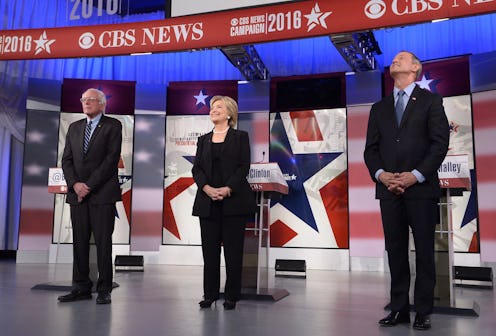News
Who Won The Second Democratic Debate?
Whew, everyone okay? The second of six Democratic presidential primary debates has finally come to a close, and it was a pretty good couple of hours with the remaining trio of candidates. If you watched the debate, or if you're a political observer of any kind, you probably know the names by now: Hillary Clinton, the front-running establishment powerhouse, Bernie Sanders, the upstart Democratic socialist senator from Vermont, and former Maryland governor Martin O'Malley. And as always, everyone's talking about who won the second Democratic debate — whoever got to walk off the stage thinking, "yep, nailed it!"
First of all, let's be honest for a second: you're never going to see everyone agree on these kinds of post-debate analyses, because people's rooting interests in debates can be very deeply held, and obviously, the message your preferred candidate is pitching is the one that'll probably resonate with you most. Moreover, it's hard to know precisely how to quantify winning and losing in a high-profile spectacle like a presidential debate. Is it about who's got the facts, or who's got the earnestness, trust and passion? Or, is it "winning" in this context really just about who benefits most at the polls afterwards?
That last perspective is the one I'm going to go with: whose stock is likely to rise, and whose is likely to fall in the polls following their performance. This makes sense, because obviously, it's the only victory criteria any of the campaigns are operating under — if there's no discernible improvement to your chances of becoming president, you're not going to feel happy with the debate went on academic grounds.
And that's really why what happened tonight was so impressive. Despite facing long odds, and a news cycle that'd been dominated by terrorism heading into the debate — an issue not very in-line with his core economic justice platform, and surely a spot of greater experience for Clinton — Bernie Sanders walked away the winner of the second Democratic presidential debate, scoring some raw hits against Clinton's Wall Street coziness, and speaking authoritatively and expansively about ISIS, the Middle East,
The very nature of the debate ended up changing late in the game — CBS ultimately decided to front-load questions about terrorism, in light of the attacks in Paris, France the night before, which left 129 people dead, including at least one American. This was easily foreseeable as a big advantage for Clinton — given her years as Secretary of State, and given Sanders' heavy reliance on his domestic policy agenda, it theoretically gave her a chance to come out swinging early on an area of deep career experience.
But she might not have expected Sanders to perform quite as formidably as he did. Despite initially pivoting away from ISIS back to economics during his opening statement, Sanders capably attacked Clinton for her past vote to authorize the war in Iraq, which he characterized as the necessary precursor to ISIS' rise in the Middle East. He also set her on her heels on the topic of her huge amount of Wall Street contributions, as Business Insider detailed, suggesting that her explanations about her large amount of Wall Street campaign contributions are "not good enough," and arguing that it's no coincidence why the financial industry prefers her over him.
Let's not be naive about it. Why over her political career, has Wall Street been a major — the major — campaign contributor to Hillary Clinton? Maybe they're dumb and they don't know what they're going to get, but I don't think so. ... Why do they make millions of dollars of campaign contributions? They expect to get something. Everybody knows that. Once again, I am running a campaign differently from any other candidate. We are relying on small campaign donors. That's who am I indebted to.
All in all, it was a red-letter night for Sanders. The only true test is whether it helps him out with early-primary states, and that'll be borne out by polls in the coming days and weeks. But on the strength of his overall performance, and the authoritativeness he showed even outside of his core area of economic justice, he definitely ought to get a little bump.
